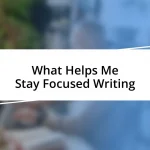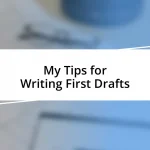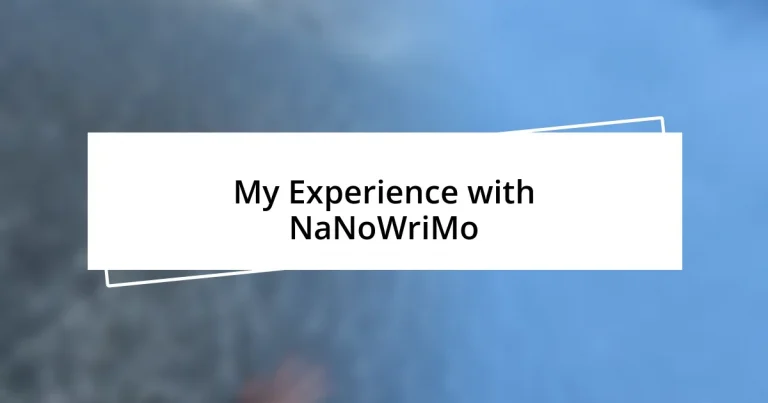Key takeaways:
- NaNoWriMo challenges writers to produce 50,000 words in November, fostering creativity and a supportive community.
- Preparation, including setting clear goals and creating a dedicated writing space, significantly enhances the writing experience.
- Strategies like maintaining a daily word count, accountability through writing buddies, and accepting messy first drafts contribute to writing success.
- Post-NaNoWriMo reflections reveal the journey is as valuable as the word count, leading to personal growth and new insights for future writing projects.
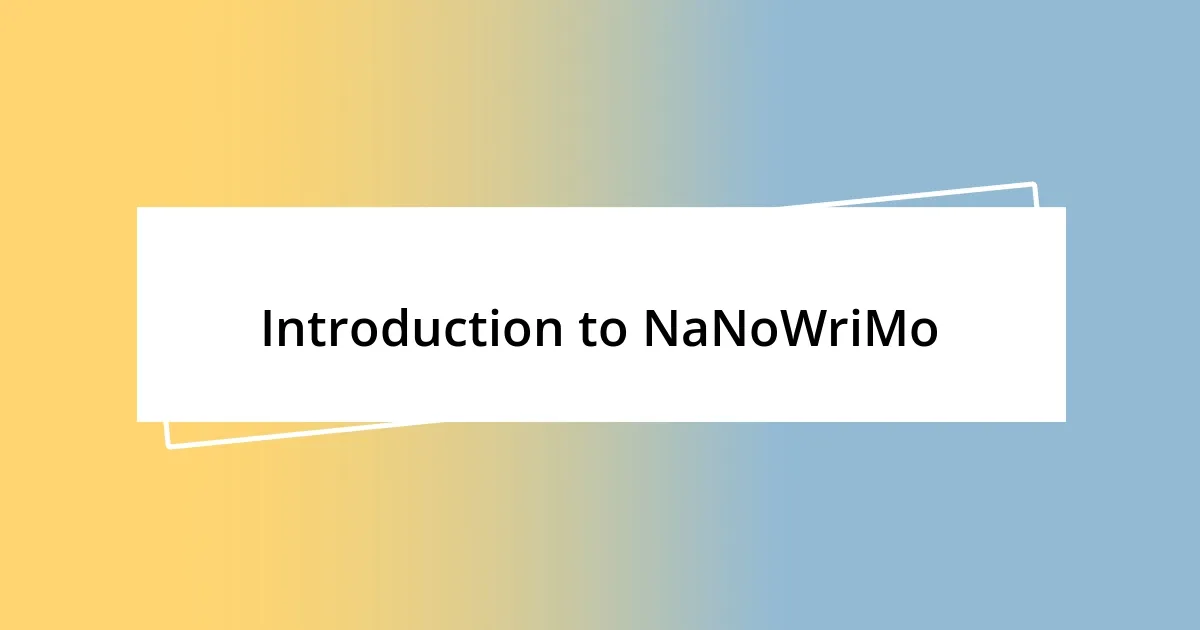
Introduction to NaNoWriMo
NaNoWriMo, or National Novel Writing Month, is an exhilarating challenge that takes place every November, inviting writers across the globe to pen 50,000 words in just 30 days. I remember the first time I heard about it; the thought of writing an entire novel in a month felt both thrilling and overwhelming. Can you imagine the creativity flowing like a river, so many stories ready to burst forth from aspiring authors?
As I embarked on my first NaNoWriMo journey, I discovered it’s not just about hitting that word count but also about embracing the community of writers cheering each other on. One night, after a long day, I joined an online write-in, and the thrill of typing alongside others ignited my passion. The camaraderie was palpable; have you ever experienced that kind of collective motivation?
Fundamentally, NaNoWriMo sits at the crossroads of discipline and creativity, pushing you to confront your fears and self-doubt. Each keystroke can be a small victory or a moment of frustration, but it’s the process that truly matters. In those 30 days, I learned that storytelling is as much about perseverance as it is about imagination, and that’s a lesson I carry with me even after November ends.
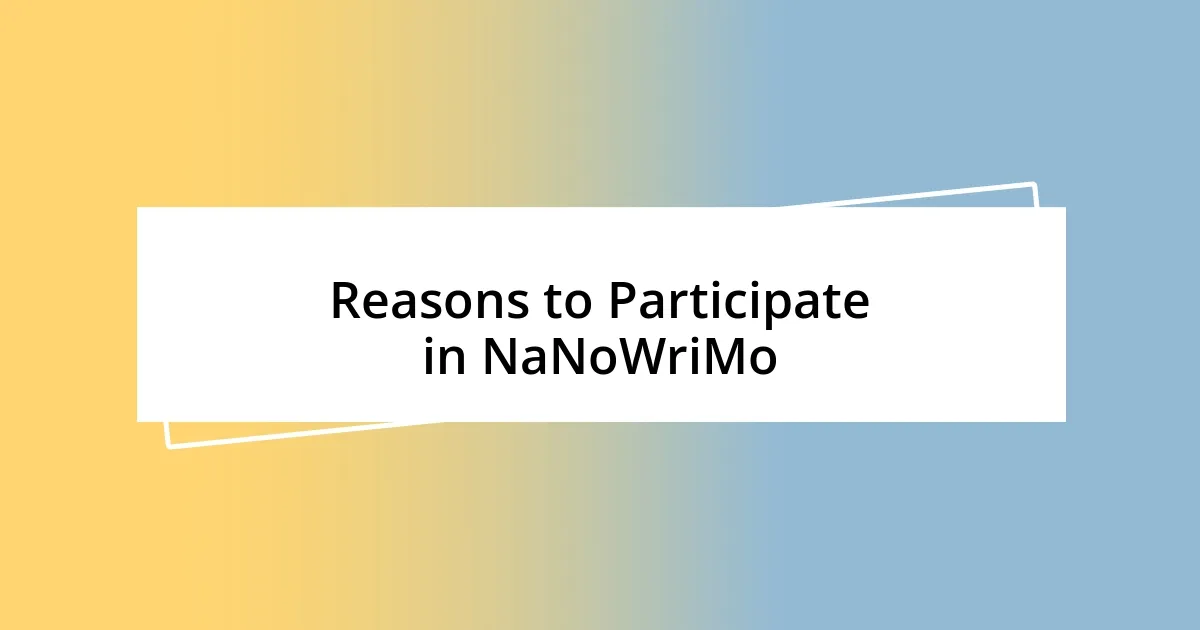
Reasons to Participate in NaNoWriMo
Participating in NaNoWriMo can be a life-changing experience, as it fosters a sense of urgency that fuels creativity. I distinctly remember my second year; the pressure of the approaching deadline transformed my writing routine. It encouraged me to carve out time in my busy schedule, and by doing so, I found pockets of inspiration in the most unexpected moments. Have you ever felt that rush when the words just flow? It’s like catching lightning in a bottle.
Another compelling reason to dive into NaNoWriMo is the chance to connect with a vibrant community of writers. I still cherish the friendships I made during those November nights spent at local write-ins, with everyone sharing their struggles and triumphs. The conversations would spark new ideas and reignite my motivation on days when self-doubt crept in. Honestly, there’s something magical about being surrounded by people who understand your journey. Have you found your tribe? I did, and it was empowering.
Lastly, NaNoWriMo pushes you to prioritize your passion, transforming writing from a hobby into a serious endeavor. I discovered that dedicating those 30 days not only enhanced my discipline but also illuminated the joy of storytelling. Each word written was a step closer to my dreams, and the sense of accomplishment built up throughout the month was truly exhilarating. It’s about more than just the finished product; it’s the journey that shapes you as a writer. Wouldn’t you agree that setting short-term goals can lead to long-lasting changes?
| Reasons to Participate | Personal Experience |
|---|---|
| Urgency in Creativity | Found new inspiration during busy days. |
| Community Connection | Made lasting friendships at local write-ins. |
| Prioritizing Passion | Transformed writing from a hobby into a meaningful pursuit. |
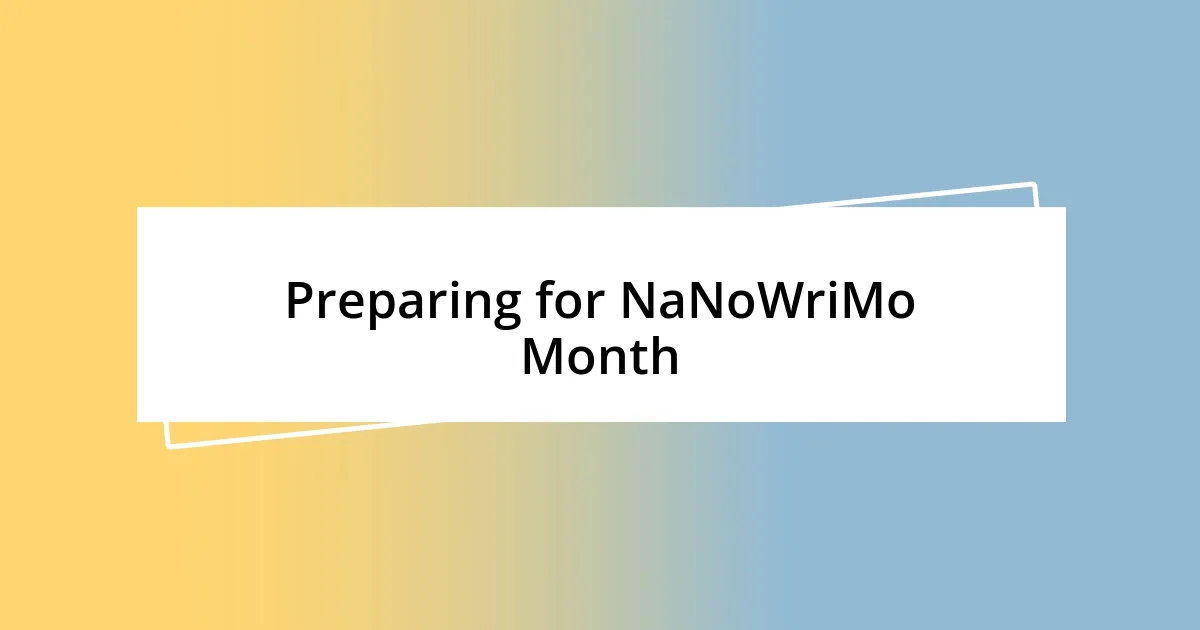
Preparing for NaNoWriMo Month
Preparing for NaNoWriMo Month can feel like gearing up for a remarkable journey. I remember sitting down with a steaming cup of coffee and a notebook, jotting down my ideas and plot outlines. It was exhilarating! Setting a clear outline helped me focus my thoughts. Not only did it offer me a map to follow, but it also opened up avenues for creativity that I hadn’t tapped into before. I found that the act of planning allowed me to visualize my characters and their journeys, almost like watching a movie play in my mind.
Here’s a checklist that helped me get ready:
- Define Your Goals: Decide on your main plot points and character arcs.
- Gather Resources: Collect any reference materials or writing prompts that inspire you.
- Create a Writing Schedule: Block out time in your calendar dedicated to writing each day.
- Set Up Your Writing Space: Choose a comfortable, distraction-free place that motivates you.
- Join a Local Group or Forum: Engage with writers who will support you during the month.
As I fine-tuned my preparations, I realized every little detail counted. I hung post-it notes with motivational quotes around my workspace, sustaining my enthusiasm on the long days. Remembering that feeling of excitement definitely added fuel to my creative fire. Are you feeling the buzz yet?
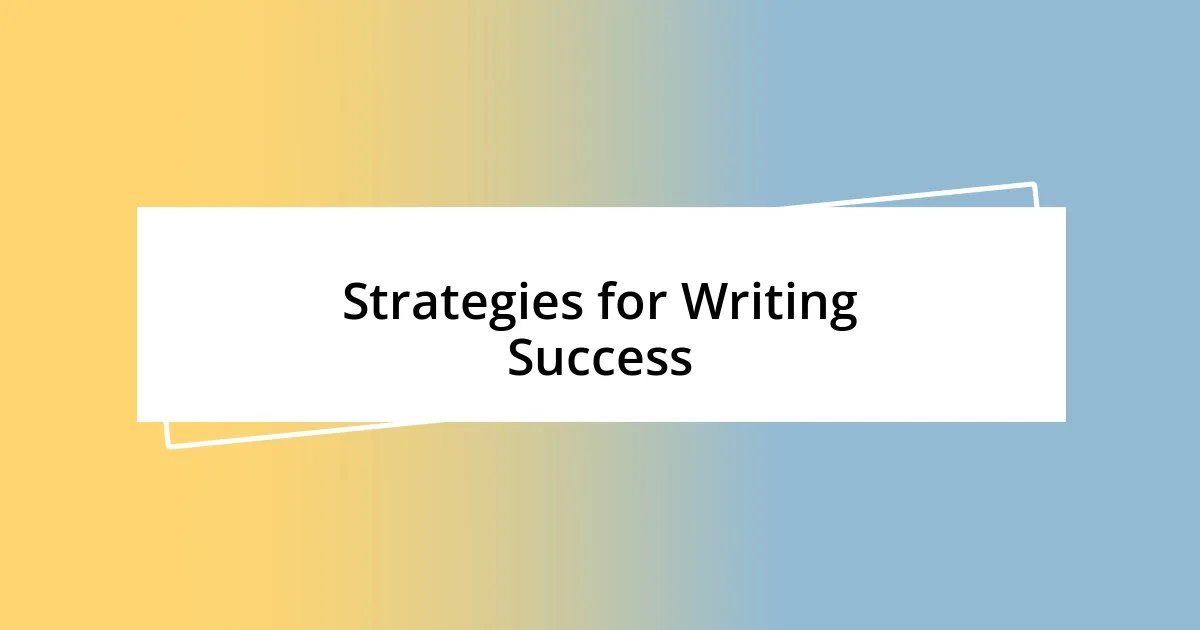
Strategies for Writing Success
To achieve writing success, I found that maintaining a consistent daily word count can be incredibly motivating. I set a modest goal for myself—sometimes as low as 500 words. Even on days when inspiration seemed elusive, sitting down and typing those few words created momentum. Have you ever noticed how small wins can snowball into bigger victories? It’s remarkable!
I also swear by the power of accountability. I sought out a writing buddy during my early NaNoWriMo days, and we’d exchange our daily progress. Sharing my goals with someone else not only made me feel responsible but also transformed writing from a solitary endeavor into a collaborative experience. This approach may sound simple, but the encouragement from my buddy helped me push through those tough patches. Have you ever felt that spark when someone else believes in your journey?
Moreover, I embraced the concept of “messy first drafts.” In my first attempt, I was paralyzed by the need for perfection, leading to countless deletions. Then I learned that it’s perfectly fine to write poorly; the crucial step is getting the words down. I remember the relief and joy I felt when I allowed myself to write without judgment. It’s liberating! Can you recall a moment when you let go of self-criticism? That’s when the true magic of creativity happens.
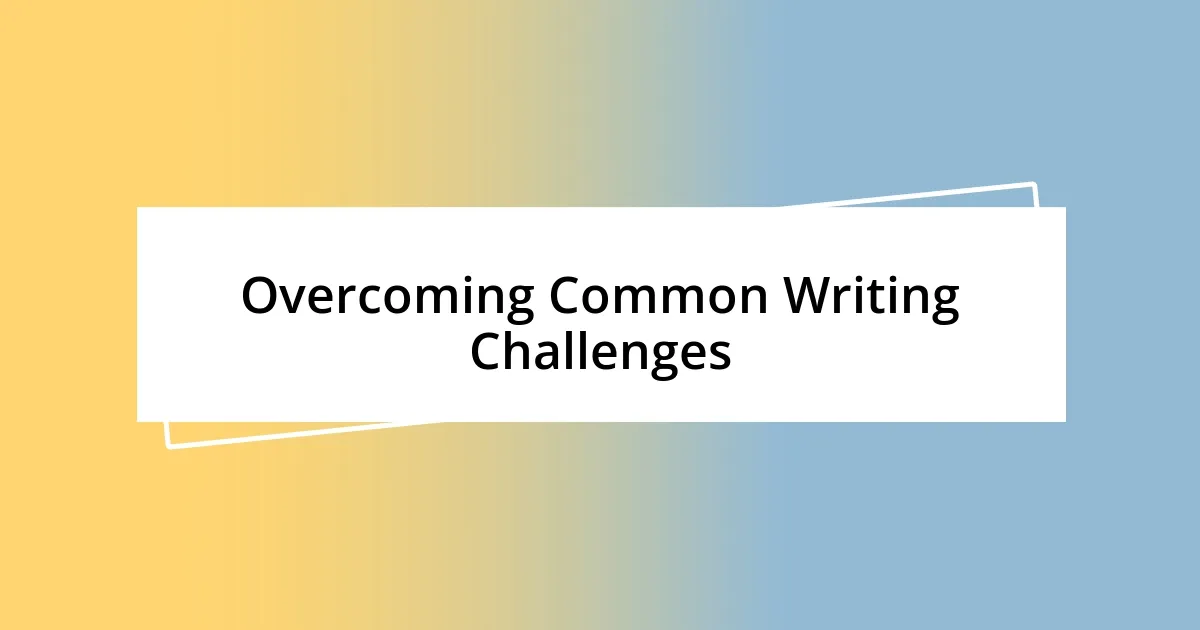
Overcoming Common Writing Challenges
Many writers face the daunting challenge of self-doubt, especially when venturing into NaNoWriMo. I distinctly remember days when my inner critic whispered that my ideas were mediocre. This is when I decided to embrace a mantra—“Just write!” Each time I silenced that voice and pushed through the doubt, I discovered a bit more of my authentic voice. Have you ever felt that rush of empowerment when you reclaim your narrative? It’s transformative!
Another hurdle often encountered during this process is writer’s block. I’ve been there too, staring at a blank page, feeling utterly defeated. What really helped was shifting my focus. Instead of aiming for a flawless scene, I began to write random sentences—anything that came to mind about my characters or plot. This release, no matter how chaotic, unlocked my creativity in ways I hadn’t expected. It’s almost like taking the scenic route on a road trip—sometimes you discover unexpected gems along the way!
Lastly, I grappled with time management, especially balancing writing with everyday responsibilities. Adopting a “power hour” routine changed everything. I dedicated a specific hour daily, eliminating distractions and fully immersing myself in my story. Those sixty minutes became sacred. I cherish the way that hour brought clarity and focus, turning daunting long-term goals into achievable short-term tasks. Have you found a method that helps you reclaim your time? It became a grounding experience for me.
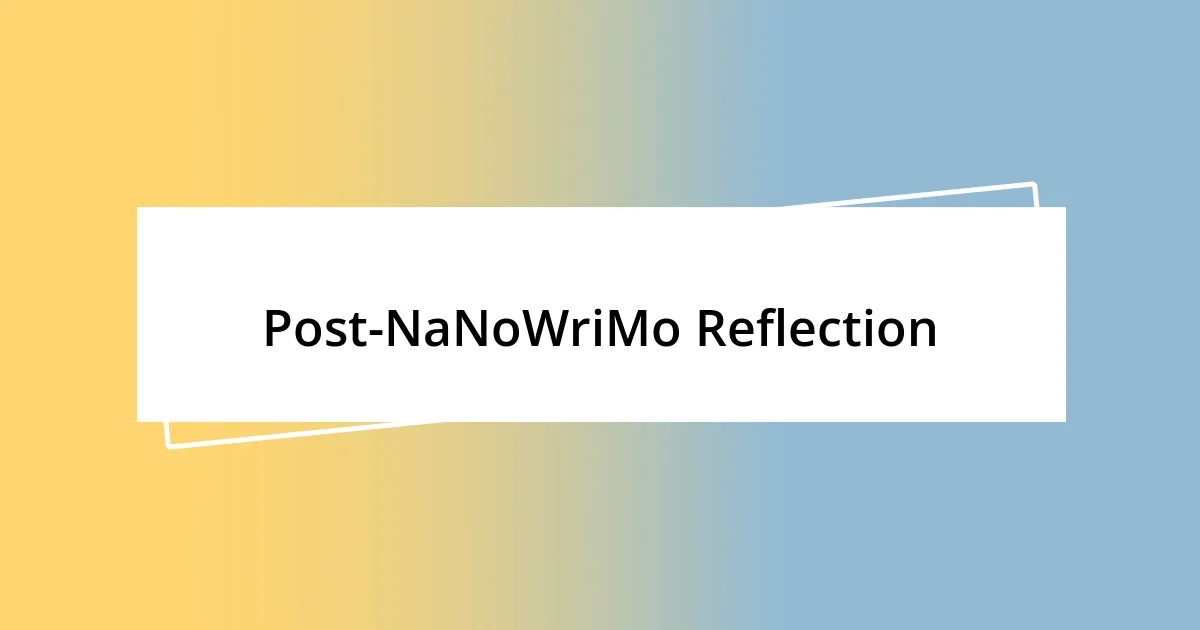
Post-NaNoWriMo Reflection
Reflecting on my NaNoWriMo experience, I found it fascinating how my perspective on writing evolved. Completing that month felt like conquering a formidable mountain; I remember looking at my final word count with disbelief, realizing that I had gone beyond my limits. Was it the words themselves or the journey that truly mattered? I believe the latter held more significance.
After the hustle and excitement of writing 50,000 words, I entered a space of introspection. It’s a strange mix of satisfaction and the inevitable post-project blues. I found myself asking, “What now?” I began to sift through my drafts with a fresh lens, gleaning insights from what I had written. This process felt almost like reconnecting with an old friend; there were moments that sparked joy, and others that made me cringe, yet every piece added to my growth as a writer.
In the weeks that followed, I learned that the end of NaNoWriMo wasn’t truly an end. Instead, it became the springboard for new ideas and revisions. I felt a stronger connection to my characters, as if I had shared an intense experience with them over that month. That chaotic whirlwind of creativity taught me about resilience and the importance of nurturing my voice. Have you ever found a surprising depth in your work once you stepped back? Embracing this reflection, I felt empowered to edit with purpose, turning my rough draft into something I could genuinely be proud of.
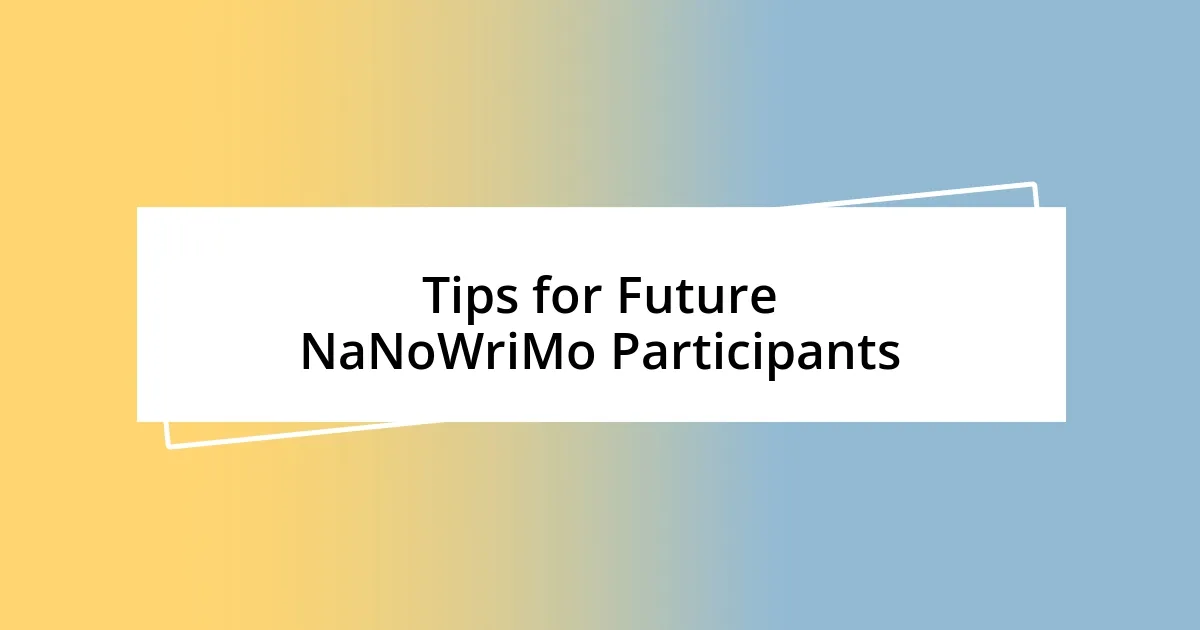
Tips for Future NaNoWriMo Participants
Certainly! Here are the paragraphs for “Tips for Future NaNoWriMo Participants”:
One tip I swear by is to set realistic daily word count goals. When I broke down the 50,000-word challenge into manageable chunks, it transformed the way I approached my writing. Instead of being overwhelmed by the big number, I focused on writing just 1,667 words a day. This made every writing session feel more achievable and allowed me to celebrate small victories—like sharing my daily progress with friends. Have you ever noticed how that sense of accomplishment can fuel your creativity?
Another strategy that worked wonders for me was creating a dedicated writing space. I transformed a corner of my living room into my personal writing nook, complete with cozy blankets and inspiring quotes. This little sanctuary became my escape, helping me to enter a focused mindset whenever I sat down to write. I found that the environment significantly impacted my productivity. How does your writing space influence your creative flow?
Lastly, don’t forget to connect with your fellow writers. Joining online forums and local writing groups was a game changer for me. Sharing my struggles and triumphs with others made the experience feel less isolating. I remember cheering on my peers and vice versa; it reinforced a strong sense of community that made me realize I wasn’t on this journey alone. How might connecting with others enhance your NaNoWriMo experience?







